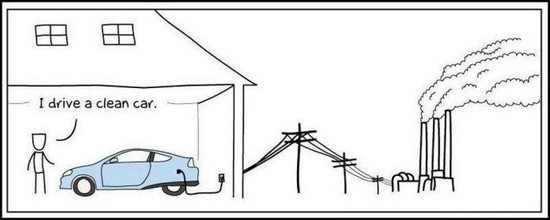
Posted on 01/22/2014 6:06:20 AM PST by MichCapCon
DETROIT — My muffled chuckle was not appreciated by the 20-something clipboard carrier hovering around EPA Administrator Gina McCarthy here at the auto show.
I tried to restrain myself as McCarthy emerged from a tiny Chevy Spark tucked along a wall at the General Motors display.
"This is my baby," she said turning back to admire the micro car.
I chuckled.
Her statement was as amusing as it was telling. After all, only a bureaucrat could look at a car that almost no one will buy and beam with pride. The only thing less popular than ultra tiny vehicles in America is Congress.
U.S. Sen. Debbie Stabenow wasn't far behind. The Lansing Democrat who famously told The Detroit News editorial board that she could feel global warming when she flies, also kicked the small car’s tires and climbed in to see the fruits of her and her colleagues’ government mandates.
Sanity returned at a Ford Motor Co. press conference nearby. And it came from Ford CEO Alan Mulally, who channeled his inner F.A. Hayek during a question and answer session with reporters and bloggers.
"We’ll always make the cars and trucks that people want," he said. "I think the automobile industry is always going to be driven by economics."
I leaned over to the guy sitting next to me to confirm what I just heard. After all, most of the press conferences and even the question and answer sessions with executives are closely scripted and lack any depth.
He went on: "The most important thing we can do is to continuously improve the internal combustion engine" because it's going to be around "for a long time."
I was stunned. And encouraged.
Despite the best efforts of bureaucrats, the auto market in the United States is largely driven by consumers. That's why the Ford F-150 pickup has been the best-selling vehicle in the U.S. for more than 30 years. The Dearborn automaker sold more than 760,000 last year.
GM sold more than 418,000 Chevrolet Silverado pickups in 2013; Chrysler sold more than 355,000 Ram trucks. Those were the top three vehicles sold last year and accounted for 1.6 million of the 15.6 million vehicles sold in the United States in 2013.
That translates to jobs and money into local economies across this country. None of that happens with the sale of electric vehicles and clown cars, especially when the sale of them depends on tax breaks and incentives..
Someday bureaucrats and politicians might recognize that fact. Until then, we will unfortunately have to listen to them blindly, and foolishly, push bad policies and promote products that most people don’t want.
Is it cheaper in the long run for me to buy an old sixties Ford truck that I can work on myself but only gets 10 MPG or buy a modern truck that I cannot work on but gets 20 MPG and only lasts 10-12 years?

Yes, the trunk is sacrificed for more battery.
Make a nice golf cart.
I don't think that the people at the EPA ever talk to the people at the NHTSA.
I can’t see where the micro-cars make any sense. A normal compact is much sturdier, not much more expensive, and gets pretty good mileage.


"She looka like a man."
LOL!
GM sold 418K Silverados, and 184K Sierras, total of 602K. They’re basically the same truck. For 2014, Ford is going with and aluminum body but GM is staying with steel. Also, Ford is going with their V-6 for their base engine but GM is going with their 5.3L V-8. My perception of pickup folks is that they’re a fairly conservative bunch. So, these differences may test how strong brand loyalties are. Guess we shall see....
If GM were building cars that people wanted, we would have some identifiable version of the 1957 Chevrolet.
It could be done, you know. Using today’s technology, and tucking it in a shell very similar to the 1957 model, it would certainly attract a lot of attention.
“Innovative” models like the Volt or other versions of electric-powered vehicles that are much too dependent on charging at a wall socket are wishful thinking, if there is to be an appeal to the buying public.
My personal vision of future power drive lines includes mounting a hydrostatic motor at each wheel, with some version of internal combustion engine driving a hydraulic pump that would build up pressure in a reservoir. When the pressure in the reservoir became sufficiently high (but before overpressure), the constant-speed primary power source would shut off, restarting automatically when the pressure fell below a certain point, much like an electrically driven air compressor. As the brakes were applied, the hydrostatic motors become brakes, pushing pressure back into the reservoir, then as the forward motion commenced, the pressure would again drive the hydrostatic motors. In stop-and-go traffic, this would eliminate a great deal of idling time, and the entire mechanism would not be subject to the weight penalty of a battery-electric system. The system would be controlled by a master computer (not much different than most new vehicles today), adjusting road speed to pressure available at the hydrostatic motors. Already I can see refinements of this concept, adapting the speed of each wheel when rounding a curve. Each wheel of the vehicle is turning on a different steering radius, requiring that adjustments be made, to maintain maximum traction at all points. True four-wheel traction, with no complicated differentials, U-joints, or transmission drive lines to compensate.
Do we have the engineering technology available to produce this system? It has been around for industrial and agricultural applications for at least 50 years that I know of, usually in much larger and heavier machinery. But it could be adapted to light truck and passenger vehicle use, entirely road-legal.
http://www.youtube.com/watch?v=Wac1ofVYfd0
Do you have your groceries delivered?
Actual energy efficiency, apples to apples, of electric cars are vastly overstated.
Electricity generation is at most 60% to 70% efficient. Then there are additional energy losses in transmission, battery charging and battery discharge.
By the time you add all those up, a gallon of gasoline-equivalent fuel burned to produce electricity finds it pretty difficult to compete with a gallon burned to actually drive a vehicle down the road. Last time I checked, electricity still comes out ahead, but not by much.
Found this from an interview...
Q: What kind of car do you drive?
A: I don’t have a car.
Suppose her wish is for no one to be able to own a car?
We own a Mazda 3 hatchback - ok trunk space, but the seats fold down and I take my husband to work in the morning and he can throw his bike in the back and ride home at night. Gets around 40 mpg on the highway (39.4 on our trip to Denver last May and that’s with lots of altitude changes!)
No, it’s not a hybrid but very sound and economical...Only things I don’t care about it is when the windows in the back are down there is a weird noise with the air passage, so I never roll all the windows down at once. The other thing is there is a nasty blind spot when you look behind the driver’s side - have to pay attention carefully when changing lanes and backing...not necessarily a bad thing!
I have a Pontiac Vibe. Get 37 mpg on the highway, but that’s driving 60.
30 mpg or so around town.
Yes, it is cheaper. Compare MPG/savings vs Opportunity Cost/Acquisition Cost, you will see.
An older mustang, jeep or pick-up will run in just about any reasonable condition of repair. Maybe not perfect, but good enough to get you home if needed.
Try that with a more recent vehicle with multiple “sensors”.
Crank sensor off a bit because cold/hot/wet weather? . . . you’re sunk. Temp sensor off because of corrosion? sunk.
Just like Grandpa, pour some vodka or “hooch” in an old car and it will fire right up.
Can’t do that with no electric car.
I could get any car made before 1972 up and running by myself.
If I were able to work on my own vehicles I would opt for the older vehicle and work on it myself. Heck if I were really mechanically inclined I would experiment with steam engines and other kinds of engines.
Disclaimer: Opinions posted on Free Republic are those of the individual posters and do not necessarily represent the opinion of Free Republic or its management. All materials posted herein are protected by copyright law and the exemption for fair use of copyrighted works.